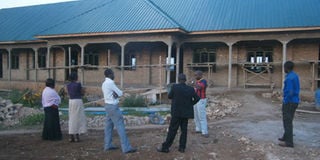For raising him, Lwengo man rewards his village

A vocational school
What you need to know:
Lwengo District was in the news last year when the chairperson caned residents for being idle. But one resident has provided a place where residents can keep busy and learn something, in the hope of developing their livelihoods.
David Ssemwogerere, 37, is truly committed to his village and its people. While many educated young men and women born in rural areas often go to towns far away from their homes and even overseas in search of employment and a better life, Ssemwogerere chose to return to his home village after completing his education to use the knowledge and skills he had acquired to uplift the living standards of his local community by setting up the Suubi Education and Community Development Centre.
Lubanda Village in Kisekka Sub-county, Lwengo District, where Ssemwogerere was born, used to be a very ordinary village like any other in rural Uganda some 15 years ago. Today, with the establishment of the centre about 10 years ago Lubanda is a changed place.
The activities at the centre
The women can access antenatal care right on their own village and they can deliver babies under the care of midwives right there. The centre has a fully functional dispensary to provide general medical services complete with a laboratory and an ultra sound scanning machine.
Suubii is the Luganda word for hope and the activities that go on at the centre and how they affect the people that come to it, reflect its name. Apart from the dispensary, the centre also has a computer laboratory where the youths and school children living nearby go to acquire computer skills. The centre has a component for local women to learn embroidery, crocheting, sewing and handcraft.
The centre also teaches modern agricultural skills to the youth. Once in a while the centre has solicited the services of volunteers from Makerere College of Agriculture and Environment Science to give regular talks to the village members and the nearby schools and communities about environment preservation.
Ssemwogerere believes that the youth need not leave their villages to go to towns to find employment if they are equipped with the right skills. He has a lot of faith in agriculture as a form of gainful employment if the youth are well prepared for it. As a boy, he kept local chicken, rabbits, and pigs besides growing tomatoes and cabbages which he sold and bought himself, among other things, a bicycle that he rode to and from school when he attended St Bernard’s College Kiswera (a private secondary school) a few miles away from his home before joining Makerere University. He wants every school to have a school garden so that the children get a good training in farming. A few months ago, the centre gave out water tanks, garden tools, wheelbarrows, watering cans and spades to some 24 primary schools in its neighborhood. It also gave out sports equipment and attire to different teams.
“It was my childhood dream to help my people get the opportunities and services that we missed,” he tells Daily Monitor in a small office at the Suubi dispensary. “Shortly after coming out of Makerere University, I served briefly as a volunteer with NAPE (National Association for Professional Environmentalists). It was an opportunity for me to learn about environmental issues in a more practical way and to meet several unique people that gave me encouragement to begin working on establishing the centre.”
How the centre sustains itself
He is quick to mention one Australian woman, Helen Brown, who he says has contributed a lot in terms of ideas and mobilsing funds for the centre Sometimes he has travelled to countries such as Germany, Sweden, Spain, Australia, Thailand and Denmark to participate in fundraising activities to sustain the centre. Nowadays, the centre generates some income from its music equipment, plastic chairs and tents which it hires out nearly every weekend for functions.
“The dispensary also charges a fee of between Shs3,000 and Shs5,000 for meeting such expenses as health workers’ salaries and overhead costs such as electricity,” Ssemwogerere explains. “We also hire out accommodation to volunteers and students from overseas who come here to help with development work or to carry out research.”
Ssemwogerere, who recently completed a master’s degree in Rural Development, has embarked on building a vocational secondary school in the village. “It is going to be a triangular based institution focusing on the school, the student and the home,” he said. “The student’s personal vocational interests must be considered, the school should be able to cater adequately for the student’s interests and the home should monitor and encourage the student.”
At the start, the school, which opens its gates this year to its first students, will teach wood work, metal work, music, catering, and hair dressing apart from academic courses. “It is built in such a way that all the time we have to learn something important,” remarks Ponsiano Mukiibi, a resident. “One example is that the biogas to be used for heating in the science laboratory, which will be obtained from the school latrine.”
James Nkalubo, a resident, wonders why Ssemwogerere does not think about standing for election as the area MP. An old woman whose house was damaged in a rainstorm and who Ssemwogerere helped to restore it, also says he is fit to be an MP.
On this Ssemwogerere says: “I am already serving the community and I have no ambitions to join politics.” He was however elected Chairman of Lwengo District NGO Forum last year. George Mutabaazi, the district chairperson, has described him as exemplary.
“When President Museveni visits our district next time, this is the place I will want him to visit,” Mutabaazi says.




